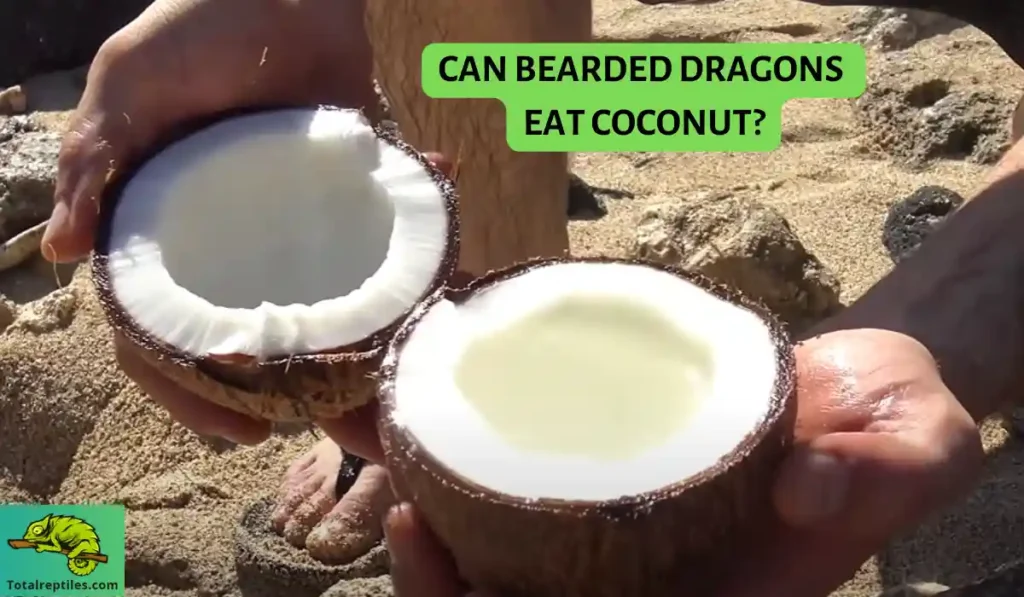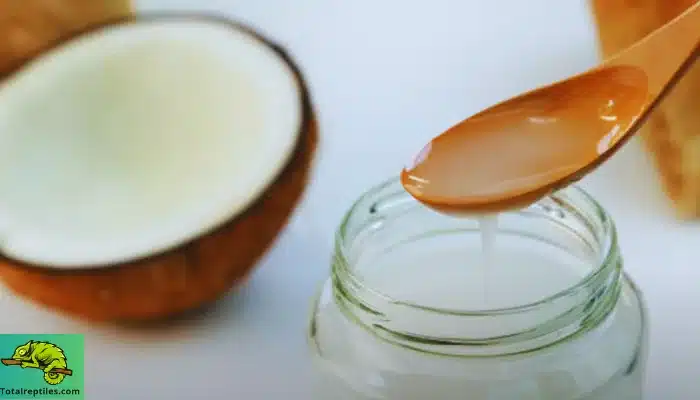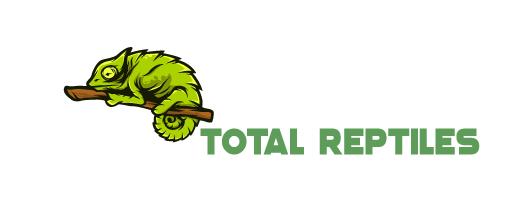The truth is that bearded dragons can eat coconut in small amounts as an occasional treat. When consumed sparingly, coconut meat, milk, and oil provide useful vitamins, minerals, and fats.
Do you ever look over at your reptile friend and wonder – can I give my bearded dragon some of my coconut water? Or maybe you’ve spotted those shreds in the exotic pet store and thought it could make a tasty treat.
Let me explain to assist you in deciding. Grab a coconut water, relax, and let’s learn! This is going to be useful stuff for any beardie owner.

Nutritional Considerations of Feeding Coconut
These tropical fruits are nutritious, but they also have drawbacks. We must consider these benefits and downsides to choose the ideal option for our beardie.
The good stuff
First, look at the benefits:
- Coconut is low in sugar compared to other fruits. This reduces obesity and diabetes risk.
- It contains lauric acid. This may support Beardie’s immune system.
- Coconut is high in fiber, which aids digestion.
- It has vitamins C, E, B1, B3, B5, and B6. These help brain function, hormone balance, and cell growth.
- Minerals like iron, calcium, magnesium, and phosphorus help strengthen bones and muscles.
Coconut can be a great addition to beardie’s diet! The nutrients support overall health.
Potential risks
There are some potential drawbacks to look out for:
- The calcium-to-phosphorus ratio is imbalanced. Too much phosphorus can prevent proper calcium absorption. This could lead to metabolic bone disease.
- High fat content. Too much fat can cause obesity and liver disease in beardies.
- Oxalates. These antinutrients bind to calcium and inhibit absorption. High oxalate diets are risky.
- Allergies. Some dragons may be allergic. Reactions like swelling and lethargy can occur.
With a balanced diet and proper precautions, beardie can safely enjoy coconut as an occasional treat! Monitor their health, and consult an exotic vet if ever unsure.
Different Ways to Feed Coconut
When feeding beardie buddies, knowing how to prepare and serve new treats properly is important. There are a few options for incorporating Dragon’s menu.
Shredded Coconut
Shredded or flaked is a great way to add small amounts of this fruit. When shopping, be sure to get unsweetened. Sulphites can cause adverse reactions. Before serving, rinse thoroughly to remove residues. Pat it dry, then chop it into tiny pieces no larger than the nail on your little finger. Large pieces pose a choking hazard.
Add a sprinkling of shredded coconut on top of dragon’s salad a couple of times per week. Start with 1 teaspoon and monitor their reaction.
Coconut Milk
Plain, unsweetened coconut milk can be eaten by bearded dragons occasionally. Make sure it’s free of additives. Reduce it with equal water so it’s not too rich. Serve just 1-2 teaspoons per feeding and monitor stool quality.
Dip some collard green leaves or butternut squash pieces in the watery milk, or use a syringe to allow the dragon to lick small amounts directly.
Coconut Oil

Bearded dragons can eat coconut oil. Organic virgin coconut oil is great for boosting nutrition. It contains fatty acids for energy and lauric acid for immunity. Add a few small drops to your dragon’s salad several times weekly. Start with 1/4 teaspoon and gradually increase to 1 teaspoon if well tolerated.
You can also rub a tiny amount on your hands, then gently spread it on your beardie’s nose during handling. They’ll lick it off and get the benefits!
Precautions
Whichever way you choose to serve it:
- Make sure coconut is only a small portion of the overall diet.
- Introduce slowly and discontinue if any signs of illness.
- Keep track of weight gain and adjust as needed.
Varying the diet with treats like coconut can make mealtimes more exciting!
Watch for Adverse Reactions
When introducing any new food, monitoring beardie for potential allergic reactions or intolerances is important.
Keep an eye out for these signs dragon may be reacting poorly to coconut:
- Swelling around the mouth or eyes
- Wheezing, coughing, or breathing issues
- Red, itchy skin or hives
- Lethargy and lack of normal activity
- Loss of appetite or refusal to eat
- Frequent diarrhea
- Signs of nausea like an arched back and gagging
If you observe these symptoms after feeding coconut, discontinue use immediately. The reaction may be mild but should be avoided in the future.
Smart Guidelines for Feeding Coconut
let’s discuss some smart guidelines for safely incorporating it into their diet.
Start slow
When first introducing coconut, start with a tiny amount, like 1/4 teaspoon shredded or a couple of drops of oil. Monitor the dragon closely for a full day afterward. Make sure their appetite and activity level remain normal.
Gradually increase the serving size over weeks if no adverse reactions occur. This gives their digestive system time to adjust.
Limit frequency
Experts recommend limiting coconut to at least 1-2 times per week. This prevents too much fat and excess calories from disrupting their balanced nutrition.
Watch proportions
The coconut should represent only a small portion of their overall weekly diet. Leafy greens, veggies, and lean proteins should make up most of their nutrition.
To avoid obesity and liver disease, coconut treats should not replace these healthy staples. Keep the ratio of fruits to greens/veggies low.
Consult an exotic vet
If your beardie has any underlying health issues or you have any concerns, consult your exotic pet veterinarian.
Discontinue if issues arise
If you notice symptoms like diarrhea, weight gain, or lethargy after feeding coconut, stop serving it immediately.
Maintain proper husbandry
Make sure housing temperatures, UVB lighting, and hygiene practices are optimal. This supports your dragon’s health and ability to digest new foods.
Conclusion
coconut can be a nutritious and safe treat for bearded dragons in moderation. By starting slow, limiting frequency, and watching for reactions, pet owners can allow their beardies to enjoy the benefits.
Vitamins, minerals, fiber, and good fats are in this fruit when eaten properly. Keeping the overall diet balanced and monitoring for adverse effects is important.
With some simple precautions, this tropical fruit can give our pet buddies some tasty variety. Coconut’s a nice change of pace from the standard salad ingredients.

